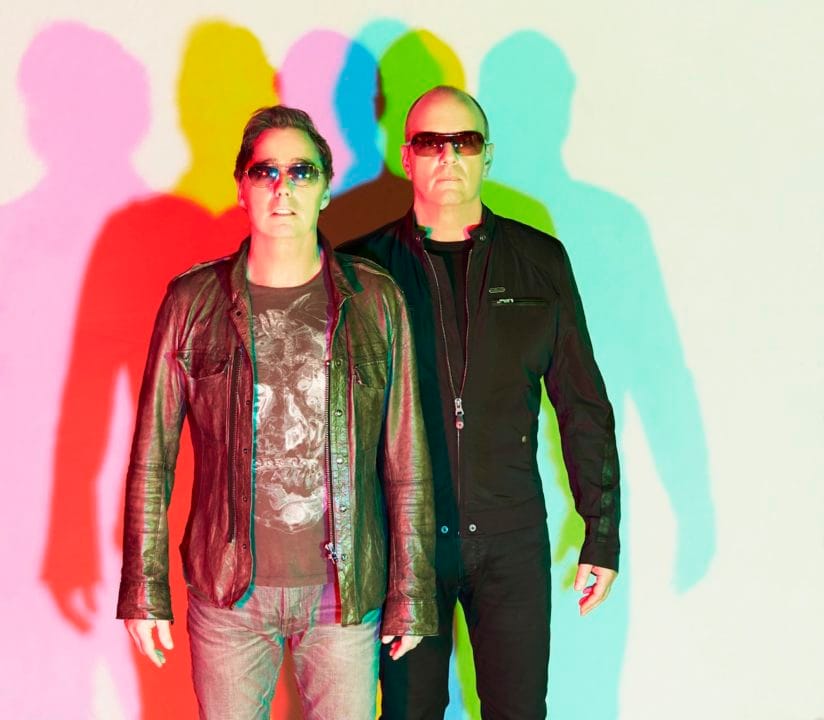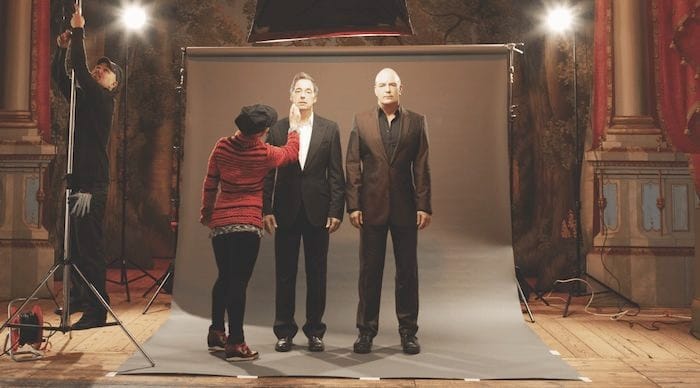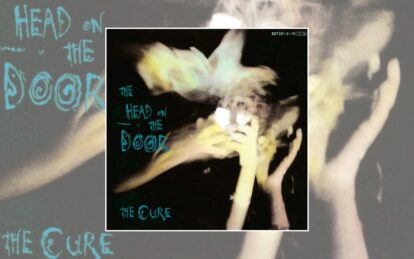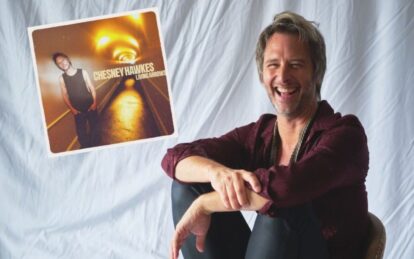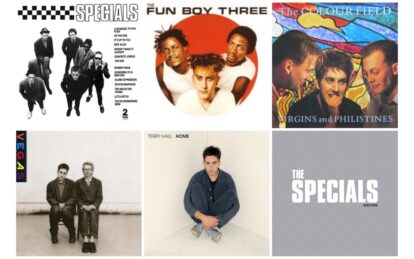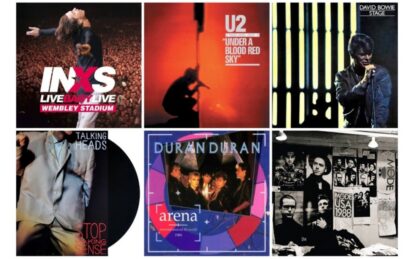The friendship at the heart of Go West is still strong after nearly four decades, despite temperamental differences. Classic Pop hears how two lads from Twickenham made it to Hollywood. And back. By Will Simpson
“I wouldn’t say we were a Premiership band,” ponders Richard Drummie of Go West. “We nearly got promoted a couple of times, but we didn’t have the momentum. Someone like Madonna puts out an album every year but we’d have these stonking great gaps between records. We did nothing between 1987 and 1990 and then again from 1992 to 2000. It’s a wonder we’re still here…”
The mullets and vests may have been left in the mid-80s but the relationship between Drummie and his songwriting partner Peter Cox has endured despite nearly 40 years of ups and downs and long silences. They make a contrasting pair – Peter very precise and controlled in his answers whilst Richard rambles all over the place. “I love the guy,” Drummie says of Cox. “He’s one of the best singers on earth.” The vocalist seems more circumspect about their friendship: “We are different but somehow we always find a way to make it work.”
The duo are set to undertake their first ever orchestral tour in May 2021, which – Covid permitting – should provide another upswing to what has been a rollercoaster-like career. Whilst many of their contemporaries didn’t get a third act to their story, Go West are now onto their fourth (or is it their fifth?).
And, unlike their peers, the duo didn’t come up through punk or have any connection to the New Romantic scene. As their name alludes, most of their influences were American – Todd Rundgren, Steely Dan and what today would be dubbed ‘yacht rock’. “When punk was happening we were listening to The Doobie Brothers,” says Drummie. “We couldn’t have been more out of step with what was going on.”
It started in early 80s Twickenham when Peter Cox saw a review in the local paper of a band that sounded similar to his own blues rock outfit. He inquired about their next gig but as they hadn’t organised any was instead invited to their next rehearsal. “Pete came along and unbeknownst to me was actually there to see if our drummer was any good so he could poach him!” Richard reveals. “As he was leaving, it was one of those sliding doors moments. I could see him walking out of the door and shouted, ‘Excuse me mate, have you got a tape of your band?’ And, of course, he did. I took it home, listened and was blown away by it, particularly his voice.”
The two quickly became friends, bonding over records, films and cheap bottles of wine. Gradually, the idea of writing music together developed and early versions of Haunted, from their self-titled debut and We Close Our Eyes – originally titled I Need Your Love – were sketched out.
Songwriting was, indeed still is, a tense process. “We both do everything,” explains Richard. “It’s not like one of us does the music and the other concentrates on the lyrics. So every decision is a head-to-head or has the potential of being a head-to-head. It’s very rare that I walk in with four lines in a row that Pete thinks are all good. He’ll always want to change something and vice versa.”
“When it comes to the lyrics, it’s always been a case of sitting together and shouting out and each turning down the ideas,” explains Peter. “It can be quite fractious. Hopefully, when it’s clicking the best of both of us goes into a song.”
The duo were helped when keyboard player Dave West and producer Gary Stevenson came on board. “Dave was a fantastic resource to have available,” says Peter. “Really amenable, listened to what you had to suggest, but was really adept at dialling in sounds on synths.
“When we first started writing with Gary one simple change he made to a lot of the songs was to speed them up to a point where it didn’t ruin the track. So We Close Our Eyes was sped up to the tempo that people are more familiar with now.”
The duo spent years hawking their demo around record companies. It wasn’t until they added Call Me (their second hit) to their repertoire that Chrysalis finally took the bait. “It was getting really frustrating,” Richard recalls. “After EMI turned us down I started the bones of Call Me. I put the blinkers on and went ‘commercial commercial commercial’. When you hear Call Me, you can tell it’s commercial but you should have heard the demo – it sounded like seven ice cream vans coming round the corner. It was just so poppy. But it got us signed.”
The duo found success straight away. The key was Godley And Creme’s video for We Close Our Eyes, which, to the British record-buying public, indelibly linked the image of a sweaty vest-clad Peter and a flock of prancing mannequins to the band name.
“It was one of the toughest day’s work I’ve ever done,” the frontman recalls. “I was so nervous – I hadn’t had a great deal of performance experience. But that underlines what smart guys Godley And Creme are because they had foreseen I might be something of a shrinking violet in front of the cameras. I didn’t know anything about the famous wrench until the day of the shoot!”
The video did the trick and We Close Our Eyes reached No.5 in March 1985. So began the duo’s annus mirabilis. Pop abhors a vacuum and it undoubtedly helped their cause that the front row of British pop – Frankie, Spandau, Duran and, especially, Wham! – were dormant for much of that year. Go West filled a George and Andrew-shaped hole in many a pop fan’s life.
“There were just so many firsts,” remembers Richard. “The very first gig with the band was recorded for Radio One In Concert. Then we all got on a bus and went up to play The Tube. Then came the first Top Of The Pops. After that we did this massive show at Yokohama Baseball Stadium with Culture Club, The Style Council and The Associates. I was pinching myself that I was in Japan, in the bar, with Paul Weller, Boy George and Billy Mackenzie! Then there was the States – we played Soul Train. I mean, how on earth did they get us on Soul Train?”
Peter found instant fame more difficult than his gregarious partner: “I didn’t have a car and had been used to travelling on public transport. You quickly found that once you’d been on TV a couple of times you attract some attention when you’re on the bus. I wasn’t immediately comfortable with that.”
The year culminated in the duo picking up Breakthrough Act at the 1986 BRIT Awards. Richard: “It was the same year that a-ha broke and I thought, ‘Well they’re going to win this by miles but let’s go along anyway.’ But as you do at these things, I would be at the Champagne if it was free and Gary Davies got up and called our name out. I couldn’t believe it. I stumbled through an acceptance speech and nearly burst into tears. Then I thought, ‘What about a-ha? They must be gutted!‘ Course it was later explained to me that it was British Breakthrough Act so they wouldn’t have won it anyway.”
But Go West’s good fortune didn’t last. Their second album, Dancing On The Couch didn’t emerge until mid-1987 when it flopped badly.
“We were too late,” admits Peter. “Pop audiences were very fickle and we didn’t have the strength of material. Like so many bands before us, the nine songs on the first album were the result of years of writing. Then we were expected to come up with another 10 as good as those in six months.”
From start to finish, the experience was a miserable one. The band’s manager suggested a writing retreat on the Isle Of Man. “There are only so many songs you can write about the Isle Of Man,” laughs Richard.
“I don’t think we wrote any. Then we went to record it in Denmark at this residential studio which had none of the normal things that come with a residential studio. No snooker table, no swimming pool. I think I went into the town once while we made that album. We spent probably six to eight months living in a bubble.”
Dancing On The Couch did at least contain one gem, which exchanged the band’s synthy comfort zone for a smoky jazz club: The King Is Dead. It also boasted guest vocals from proper pop royalty in the form of Kate Bush. Peter: “That was our guitarist Alan Murphy – bless him [Murphy sadly died of an AIDS-related illness in 1989]. He’d played in Kate’s band for some time and we were in the studio in Denmark working on that song and somebody said, ‘Ooh, it would be good to get some vocal arrangement on this?‘ And Richard has always had this mantra of, ‘If you don’t ask, you don’t get’ [see panel], which is something we’ve argued about on many occasions. In this instance he said, ‘Wouldn’t it be great to get someone like Kate Bush?’ to which Alan replied, ‘Why don’t you just ask her?’
“I’m sure it was Alan who made the call. There was no way that she was going to fly to Denmark to sing on our record, but she agreed to help. So the track was parcelled off, Kate recorded all her vocals in her home studio and sent the tape back, wrapped in foil, by air. We got it in the studio in Denmark, took the foil off and put it on the machine.”
But Chrysalis weren’t happy with the lack of return on their investment. A showdown between band and label ensued and Go West were stuck in pop limbo for three years. They were saved by their old Chrysalis A&R man Ron Fair, who signed the duo to EMI in America and smuggled them onto the soundtrack of a movie with the unpromising working title of $3000.
“We had this song, The King Of Wishful Thinking, which I knew was a hit,” says Richard. “One day Ron said, ‘Great news. I want to put your song in this film.’ We went, ‘No way!’ cos we knew how it worked with films. You get a bit lost amongst the higher-profile artists and we felt if we put this song in that film we would be off for six months promoting their soundtrack record, not our new album.
“Then we asked, ‘What’s this film called?’ He said, ‘They haven’t got the title yet but at the moment it’s called $3000.‘ ‘Oh no, a sci-fi film! Can’t think of anything worse!’ He says, ‘No it’s a romantic comedy – it’s about a guy that hires a prostitute for the week for $3,000.’ Who’s in it?’ ‘Julia Roberts.’ ‘Never heard of her!’”
Pretty Woman went on to become one of the biggest global box office hits of the early 90s and The King Of Wishful Thinking returned Go West to the UK charts and went Top 10 in the US. It laid the foundation for the band’s comeback album, 1992’s aptly-named Indian Summer and further hits in Faithful and What You Won’t Do For Love.
“That was really gratifying,” says Peter. “It was a second bite of the cherry. We weren’t thinking about stardom or even money really. We were just enjoying making a record – for us that was living the dream. To have a fallow four or five years and then to come back with hit singles in the UK was very satisfying.”
By this point the band were based in Los Angeles, which put a strain on Peter and Richard’s relationship. “When we got there EMI said, ‘We’re going to put you in this house,’” recalls Richard. “I said, erm, houses, surely?’ ‘No, this house.’ And I thought, ‘This isn’t good.’ Quite often we’d leave the studio with… shrapnel. We were working with each other all day and then going back to the house at night and, of course, the conversations would continue. Sometimes they’d be constructive; often they weren’t.”
In the end, Peter left for a solo career: “By that time we’d spent about a decade being in each other’s pockets. I needed some space. And I’d really fallen in love with California. I loved it out there and Richard very definitely did not. So I told Richard on a flight to New York that I was going to have a go at things on my own for a while.”
“I was really sad about it,” his partner remembers. “When we landed, I hired one of horse and carts that go around Manhattan and I think I went to every Irish bar in town that night.”
And that was that. Except there was a further twist in this tale. By 2000, Peter’s solo career had run aground. His father had become ill and he’d returned to the UK. Meanwhile, the band were getting offers to tour once more.
Richard: “My kids were growing up and kind of wondering what dad does and a gig offer came up at Wembley Arena. I thought, ‘Ooh, if my kids come to that they can see me on stage in front of 12,000 people.’ That’s what made me do it. That and the fact that by then I was running out of money.”
Since they reformed there has been new material, too – a fourth album, futurenow in 2008 and 3D in 2013. But it’s the live gigs that supply the band’s bread and butter, which is why they are hoping that their 2021 orchestral tour goes ahead as planned. “I realise the situation is evolving, so who knows?” says Richard.
How the synth-heavy Go West sound will work with an orchestra behind it is a tantalising question. “I’m uncertain as well,” says Peter. “But a lot of people around us think it’s going to be fantastic and certainly there are songs in our catalogue that might not have been the hit singles that would lend themselves to orchestral accompaniment. How it’s going to work with a song like We Close Our Eyes we’ll all have to see!”
Classic Pop may earn commission from the links on this page, but we only feature products we think you will enjoy.

